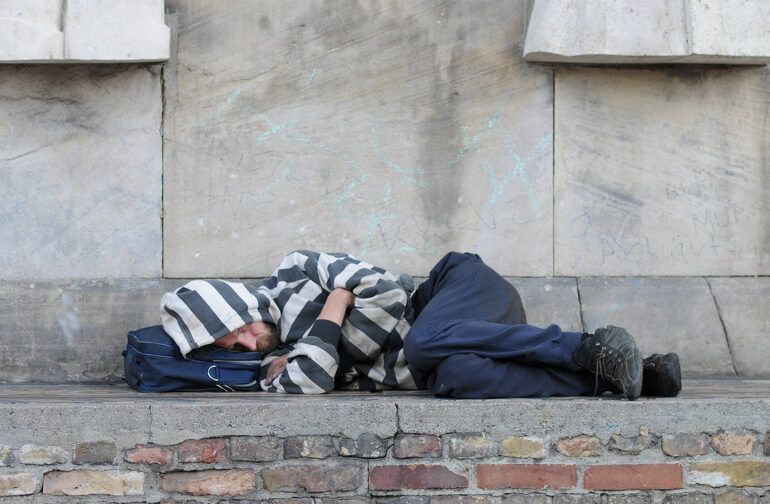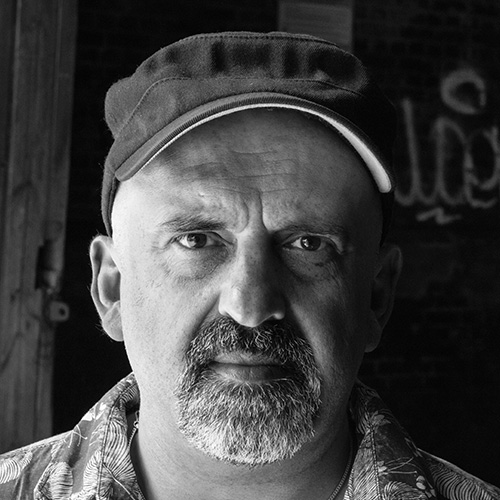Squatter activists occupying the old Cornerhouse cinema building near Oxford Road Station have vowed to resist any future eviction attempt, after thwarting an eviction on the 25 April, which saw the roads around the Cornerhouse closed down. The activists are holding their ground to offer shelter, support and advice to homeless people in the previously unused building. They also wish to raise the profile of the housing crisis in Manchester and are demanding the authorities provide solutions now.
The squatters are members of the Manchester Activist Network who as part of The Loose Space autonomous art collective, set up what was initially planned as a two week art project & festival in the Cornerhouse building. The building, which is owned by Network Rail, has been abandoned for two years after the cinema moved to the new arts centre called HOME.
Initially an agreement had been made with Network Rail to vacate the building after the festival was timetabled to finish after two weeks with a finale event on the 1 April, as reported previously in The Meteor (see video below). Some groups and individual members of the Loose Space Collective have moved on from the Cornerhouse to set up another two squats in the city centre.
The Manchester Activist Network decided to continue resisting the eviction and go on providing a home for the homeless in the Cornerhouse, as a political demonstration against the inactivity of the authorities in alleviating the housing crisis.
Chris Blaine is homeless and part of the Manchester Activist Network currently squatting in the Cornerhouse. A prolific protestor against the housing crisis, he was jailed last year for a rooftop protest, attempting to stop an eviction at the Ducie Bridge pub. He also recently took part in a demonstration at a housing hustings for the GM mayoral election in Salford, where he loudly lambasted the candidates for their respective parties’ failures in dealing with housing and homelessness issues.
Blaine says the Manchester Activist Network has come under criticism for continuing its protest in a building owned by Network Rail and not the local authority, but he says:
“I am going against the council. I am going against the government. The simple fact of who owns the building doesn’t come into it for me. An empty building is precisely that – an empty building”
Blaine describes how pleased he was with the success of the Loose Space festival, which allowed local artists to come along and perform and held many educational workshops. The events encouraged the public and wider communities of Manchester to participate, and estimates over 4000 people attended the festival.
“But all the way through it we have been supporting rough sleepers who have been turning up from one night to the next, giving them hot meals, clean clothes, somewhere to get a wash, somewhere to charge their phones if they are lucky enough to have one, providing information and acting as a little community social hub”
Now that the Loose Space event has finished, the Cornerhouse has become mainly a refuge for the homeless. Blaine says up to 26 people, the large majority of them homeless, have slept there on certain nights when the weather is bad. Blaine insists this isn’t a solution but is a better provision than a doorway, a bin, a back alley, a car park full of dust or a tent under a bridge.
The trouble with hostels
Living in the squat provides a safe and secure environment far superior to life on the street or in the overcrowded, dilapidated, understaffed and underfunded hostels in Greater Manchester, says Blaine. He describes homeless hostels he has stayed in as “worse than jail” and says one of the major reasons he squats is to avoid them. He is proud of the ideals upheld in the squats he has lived in:
“We don’t allow hard drug use in our squats, we don’t allow violence, we don’t allow abuse – mental, physical or sexual. We try and run a home, with a family atmosphere. What I tend to find is so does everybody else, that’s what they want. That really rubs off onto new people who come into the squat. They see the camaraderie, they see the love and support amongst ourselves and they want to be involved in that, they want to be a part of that.”

Blaine worries about the effect hostels and other temporary accommodation have on young vulnerable people having to stay in them for the first time. Particularly those who may have never had a fight, committed a crime, taken drugs or may have previously been victims of abuse, who are then placed in a building housing criminals, drug abusers and people with behavioural issues:
“You stick them in a …[hostel] building and it traumatises people, it really does. I don’t think there is a person on the street who hasn’t got PTSD of some form or another. I don’t think there is a person on the street who, after being here for as long as I have been here, doesn’t go through some kind of mental breakdown, because I know I did. I was just lucky that I got through it.”
A common complaint from homeless people in Manchester is the poor quality of temporary accommodation offered, but it is not just anecdotal reports of homeless people that condemn it. A three year research study, from 2014-16, carried out by IPPR North found some temporary accommodation that “should not exist in a modern, wealthy country like ours” going on to describe it as, “appalling, unsafe and deeply counterproductive for individuals with complex and challenging needs”. The research also uncovered a culture of substance abuse, bullying and intimidation between the inhabitants but also from landlords. And the problem may be much bigger that the official statistics describe as the report also found that the use of private B&Bs and hostels is 5-10 times greater than that reported in government figures.
Mental health & homelessness
Becoming homeless is one of the worse things that could happen to you if suffering from a mental health condition, but unfortunately those with poor mental health are more likely to end up on the streets. Research by Homeless Link showed 45% of homeless people had been diagnosed with a mental health problem compared to 25% in the general population, and depression rates are over ten times higher in the homeless population. The problem is particularly acute in young homeless people. Centrepoint says many are falling through the cracks in mental health provision and described it as a postcode lottery in getting suitable care. The lack of sufficient services to help vulnerable people is largely due to the reduction of funding to local authorities after the 2008 financial crisis, which on average has reduced funding to services supporting people by 45 percent between 2009-10 to 2014-15.
Changes to housing benefit by the current government may see more young people, whether ill or not, sleeping on Manchester’s streets. The end of Housing Benefit support to 18-21-year-olds has been calculated to save just £3.3 million. But researchers calculated that only 140 young people would have to be made homeless by the cuts for knock on costs (At What Cost is a good guide to what those costs are) to mean the policy will actually cost the taxpayer more overall.
Criticism of local authorities
Homelessness was high on the agenda in Andy Burnham’s GM Mayoral election campaign. He has promised to end rough sleeping in Manchester by 2020 and committed to donate a percentage of his wages to a GM homelessness fund, but Blaine remains sceptical of how much Burnham can achieve in his new role as mayor.
“He has made a lot of promises, he is not going to keep any of them. I know he is not. Fifteen percent of his salary is not going to do anything, let’s be realistic. What he needs to do is get the funds.”
Blaine then goes on to suggest how he should find the funds:
“If he is so backing of the community and so open to issues of the local community then nail your colours to the mast. Don’t just say it actually do it: make an illegal budget, declare your budget and build, refurbish or regenerate some houses. There are thousands of them empty in GM.”
Manchester City Council (MCC) also come under fire from Blaine who says they should declare an illegal budget and “pull their fingers out of their arses and stop denying there is a problem.” He goes on to say Richard Leese, leader of MCC, “should have been sacked by now, I really don’t get it, the guy has washed his hands [of the homeless] completely”.
Resistance for existence
The occupants of the squat are apparently coping well with the threat of eviction. The one thing that is always guaranteed is that eviction will occur. Blaine see the four previous unsuccessful eviction attempts as part of a long game played for more time in the security of the squat. When it come to the next eviction attempt he means to resist it:
“To the very end by any means possible. I have been sent to jail for it in the past. Climbing on the roofs, locking on to things and barricades. We have a big group of supporters who are prepared, if we put it on Facebook, to come out onto the streets.”
Blaine is resigned to the fact that he is probably going to get locked up again for his acts of resistance but is determined to continue until there is change in housing and homelessness policy that makes a difference on the streets of Manchester:
“Until we have sufficient affordable state housing this isn’t going to get any better, it is only going to get worse. Until we get some kind of real structure of support back into community and back into the hostels all these people are just going to carry on repeating the cycles and repeating the mistakes that cause them to be homeless. Until the government and councils do something really proactive, nothing’s going to change. So I am going to carry on doing this and other people are going to carry on doing this.”
Conrad Bower
Manchester Activist Network Facebook Page – click here
Loose Space website – click here
Photos of Chris Blaine: Salford Star




lock Lisa says
Nice Performance